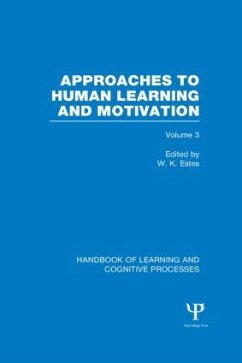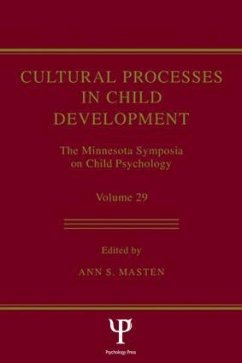
Handbook of Self-Regulatory Processes in Development
New Directions and International Perspectives
Herausgeber: Barrett, Karen Caplovitz; Morgan, George A.; Fox, Nathan A.

PAYBACK Punkte
77 °P sammeln!
The development of self- and emotional regulatory processes helps children to regulate their behavior based on their cultural context and to develop positive social relationships. This handbook brings together heretofore disparate literatures on self- and emotional regulation, brain and physiological processes, mastery motivation, and atypical development to highlight how mastery motivation is related to self-regulation and to clarify the relation between these various processes. Authors from a variety of countries and backgrounds provide an integrated, up-to-date review of the research and th...
The development of self- and emotional regulatory processes helps children to regulate their behavior based on their cultural context and to develop positive social relationships. This handbook brings together heretofore disparate literatures on self- and emotional regulation, brain and physiological processes, mastery motivation, and atypical development to highlight how mastery motivation is related to self-regulation and to clarify the relation between these various processes. Authors from a variety of countries and backgrounds provide an integrated, up-to-date review of the research and the key theoretical models to demonstrate how these processes relate to cultural and individual differences in both typical and atypical development. The renowned editors, all experts in a particular domain of self-regulation, provide section opening chapters that review the literature, provide a perspective that explains the findings, and suggest directions for future research. Although the focus is on quantitative studies, some qualitative findings and research using brain imaging methodologies are included. Outstanding features include: Reviews the development of self and emotional regulation from infancy through adolescence. Contributors from various countries and backgrounds provide an integrative review of the literature to guide the direction of future research. Features contributions from those who have had a strong impact on self-regulation research. Reviews research on developmental disorders that have implications for self-regulation. There are four sections. Section one introduces the development of self- and emotional regulation. This section reviews how self-regulation adapts based on personal and culturally-based goals and how individual differences predispose some to behavior disorders. Socialization influences are examined including a look at when typical regulation processes go awry. Section 2 examines physiological and brain processes as they relate to the development of typical and atypical processes, along with neurocognitive development of performance monitoring and how these processes change over time, cortical activation differences, and behavioral and electrocortical measures of attentional bias. Section 3 reviews the development of self-regulation and mastery motivation including a review of the Dimensions of Mastery Questionnaire (DMQ), cross-national comparisons, and what the DMQ can tell us about self-regulation. The section concludes with a look at the development of self-regulation and mastery motivation in individuals with a developmental disability. Section 4 examines self-regulation in atypical development and evidence-based treatment approaches in children with ADHD, autism, and Down syndrome. This book is intended for researchers, graduate students, and practitioners in psychology, neuroscience, human development, and education interested in the development of self and emotional regulatory processes.














